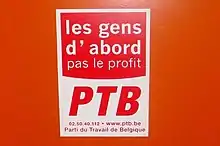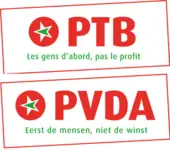Workers' Party of Belgium
The Workers' Party of Belgium (French: Parti du Travail de Belgique, PTB; Dutch: Partij van de Arbeid van België, PVDA) is a Marxist political party in Belgium that operates as a single Belgian party, in contrast to all other major Belgian political parties, which are either Flemish, Francophone or local.
Workers' Party of Belgium Partij van de Arbeid van België Parti du Travail de Belgique | |
|---|---|
.svg.png.webp) | |
| Abbreviation |
|
| President | Peter Mertens |
| Vice President | David Pestieau |
| National Secretary | Lydie Neufcourt |
| Founder | Ludo Martens |
| Founded | 1979 |
| Preceded by | AMADA (All Power To The Workers) |
| Headquarters | Maurice Lemonnierlaan 171 1000 Brussels |
| Newspaper | Solidarity |
| Youth wing | Comac |
| Membership (2020) | 20,000[1] |
| Ideology | Marxism[2][3] Communism[3] Socialism[4][5] Unitarianism[6] Historical: Marxism–Leninism[7][8] Maoism[8] |
| Political position | Left-wing[9][10] to far-left[7][11][12] |
| International affiliation | IMCWP |
| European Parliament group | GUE/NGL[13] |
| Colours | Red |
| Chamber of Representatives | 12 / 150 |
| Senate | 5 / 60 |
| Flemish Parliament | 4 / 124 |
| Walloon Parliament | 10 / 75 |
| Brussels Parliament | 11 / 89 |
| Parliament of the French Community | 13 / 94 |
| European Parliament | 1 / 21 |
| Website | |
| International | |
The PTB-PVDA used to host the International Communist Seminar until 2014 which had become one of the main worldwide gatherings of communist parties.
PTB-PVDA has traditionally been a small party, but since the mid-2010s has gained momentum and increasing popularity at the polls and elections, particularly in Wallonia and working-class communities in Brussels.[14][15][16]
History
The Workers' Party of Belgium originated in the student movement at the end of the 1960s. Students (organized in the student union SVB - Studenten VakBeweging), mainly from the Catholic University of Leuven, turned towards the working-class movement. They considered the politics of the existing Communist Party of Belgium revisionist, i.e. too much turned toward social-democratic politics (represented in Belgium by the Belgian Socialist Party). They were influenced by the ideas of the Communist Party of China, guerrilla movements in Latin America, the movement against the Vietnam War, and the Leuven-Vlaams movement, all perceived as aspects of a worldwide struggle against colonial or neo-colonial oppression and for civil or workers' rights.
Their support and participation in an important strike in the coalmines turned the movement into a political party. They founded a periodical, AMADA (Alle Macht Aan De Arbeiders - All Power To The Workers), which became the first name of their party. In 1979 the first congress was held, which adopted a Maoist programme and changed the name into PVDA-PTB. Ludo Martens became the first president, and remained an important ideologist of the party until his death in 2011.
Recent developments
Following its electoral defeat in 2003, the PVDA-PTB fundamentally changed its working methods and communication. On one hand, the PVDA-PTB said it would refocus on working with factory workers as well as on field work in the communities where it operates. On the other hand, the PVDA-PTB said it would officially break with what it calls its sectarian past to get closer to the concrete demands of citizens. This is reflected particularly by the demands put forward on very concrete issues, e.g. lower prices for medication, the reduction of VAT on energy products from 21% to 6%, an increase of the minimum pension, better control of rents or the lower cost of trash bags.
In preparation for the Belgian elections of June 2007, the Solidarity newspaper and the website of the party were merged in order to reach a wider public. The structures have also been "open" to a broader layer of activists.
On 2 March 2008, the work of the Eighth Congress of the PVDA-PTB was completed with a closing meeting at the Vrije Universiteit Brussel. This Congress was conducted with the theme of "party renewal." A new Central Committee was elected, which in turn elected a new Bureau of the Party. It consists of:
- Peter Mertens, °1969. President
- Lydia Neufcourt, °1955. Responsible for expanding the party
- Raoul Hedebouw, °1977. National voice of the PVDA-PTB
- Joris Van Gorp, °1952. Head of union relations
- Jo Cottenier, °1947. Responsible for the socio-economic issues
- Baudouin Deckers, °1946. Head of International Relations.
- Tom De Meester, °1975. Energy.
- David Pestieau, °1969. Editor of Solidarity.

This 'shift' seems to have produced some positive results, such as an increase in membership and a rebound of the electoral score of the PVDA-PTB in recent elections. The last elections in May 2019 showed more progress: a breakthrough was realised at the Flemish and European level. Since 2018 the party is also represented in the municipal councils of larger cities in Flanders, Wallonia and Brussels.
In September 2014 the party had more than 8,000 members, in 2020 the number had grown to 20,000. Its monthly publication "Solidarity / Solidarity" has between 3,000 and 5,000 subscribers. COMAC, its youth movement, is active in all the universities in Belgium and in secondary schools (in Flanders, Wallonia and Brussels). The PVDA-PTB is also known for its 11 Medicine for the people medical centres,[17] which provide free access to primary health care.
The newspaper Solidarity, and Medicine for the People organize "ManiFiesta", a yearly festival of solidarity between the communities and the left in Belgium. The first edition was held in Bredene (by the sea) on 25 September 2010 and brought together 6,000 people from both North and South of Belgium. The fourth edition in 2013 attracted 10,000 people.[18]
Controversies
Stalinism
The PTB continues to be perceived as Stalinist, in relation to the Stalin hagiography written by its past-president Ludo Martens. Current president Peter Mertens tries to get his party out of this deep-rooted paradigm.[19]
Party of the Automobile
Despite its recent conversion to ecology,[20] local WPB sections oppose any restriction related to private car use, what has led to the nickname Party of the Automobile (Partij Van De Auto in Dutch):[21][22]
- In Antwerp against the Low Emissions zone in the city centre[23]
- In Liège against fines for illegal parking on sidewalks
- In Schaerbeek against parking tariffs[24]
Electoral results
The general elections of 2007 saw the party obtaining 0.88% in the Flemish electoral district and 0.81% in Wallonia.
In the regional elections in 2009 the PVDA-PTB gained 1.04% of the vote in Flanders (+0.48%) and 1.24% of the vote in Wallonia (+0.62%). For the European elections on the same day the results were: 0.98% in the Dutch-speaking electoral college (+0.37%) and 1.16% in the French-speaking electoral college (+0.35%).
In the general elections of June 2010 the party saw further growth. In Flanders it now represents 1.3% (+0.4%) of the votes for the Chamber of Representatives and 1.4% (+0.5%) for the Senate. Especially in the cities progress was noted with high scores in Antwerp (4.1%) and Liège (4.2%). The highest scores were gained in the cantons of Herstal (9.8%), Assenede (7.5%) and Seraing (7.3%); all places where the PVDA-PTB traditionally is strong.
The municipal and provincial elections in 2012 were considered a breakthrough on a local level for the PVDA-PTB. The party won 52 seats in total; 31 in municipal councils, 4 in provincial councils, and 17 in the district councils.
The federal and regional elections in 2014 saw further success for the party. They elected two deputies to the Chamber of Representatives,[25] two others to the Walloon Parliament,[26] and finally four to the Brussels Parliament.[27]

An opinion poll released in July 2017 suggested the party was the most popular party in Wallonia at the time, with 25% of respondents indicating they intended to vote for the party. The second-most popular party was the Mouvement Réformateur, part of the governing coalition, with 23%. The poll indicated that the Workers' Party would win 26 seats in the Belgian Chamber of Representatives if the next federal election were held immediately, putting it in tied first place with the Flemish N-VA.[28]
The party generally increased its vote share in the 2018 local elections, and won over 15% of the vote in several French-speaking cities.[29]
In the 2019 Belgian federal election, the party scored well and gained 10 seats.[30] The party did well in Wallonia (13.8% overall there), scoring over 16% in Liège Province, over 15% in Hainaut Province, and also over 12% in Brussels-Capital Region.[31] It achieved at least 22% of the votes in both Charleroi and La Louvière cities. Its strongest showing in Flanders was 12.71% in Antwerp city.[32] The PTB was also the fourth largest party in the European election the same day in the Francophone areas, winning 14.59% and giving it one seat.[33]
Federal Parliament
| Chamber of Representatives (Kamer van Volksvertegenwoordigers/Chambre des Représentants/Abgeordnetenkammer) | |||||||
| Election year | # of overall votes |
% of overall vote |
% of language group vote |
# of overall seats won |
# of language group seats won |
+/– | Government |
|---|---|---|---|---|---|---|---|
| 1991 | 30,491 | 0.5 | 0 / 212 |
in extraparliamentary opposition | |||
| 1995 | 34,247 | 0 / 150 |
in extraparliamentary opposition | ||||
| 1999 | 30,930 | 0 / 150 |
in extraparliamentary opposition | ||||
| 2003 | 20,825 | 0.2 | 0 / 150 |
in extraparliamentary opposition | |||
| 2007 | 56,167 | 0.8 | 0 / 150 |
in extraparliamentary opposition | |||
| 2010 | 101,088 | 1.6 | 0 / 150 |
in extraparliamentary opposition | |||
| 2014 | 251,289 | 3.72 | 2 / 150 |
in opposition | |||
| 2019 | 584,458 | 8.6 | 12 / 150 |
in opposition | |||
| Senate (Senaat/Sénat/Senat) | |||||||
| Election year | # of overall votes |
% of overall vote |
% of language group vote |
# of overall seats won |
# of language group seats won |
+/– | Government |
|---|---|---|---|---|---|---|---|
| 2003 | 18,699 | 0.1 | 0 / 40 |
in extraparliamentary opposition | |||
| 2007 | 54,807 | 0.8 | 0 / 40 |
in extraparliamentary opposition | |||
| 2010 | 105,060 | 1.6 | 0 / 40 |
in extraparliamentary opposition | |||
Brussels Parliament
| Election year | # of overall votes |
% of overall vote |
% of language group vote |
# of overall seats won |
# of language group seats won |
+/– | Government |
|---|---|---|---|---|---|---|---|
| 2004 | 2,221 | 0.6 | 0 / 89 |
in extraparliamentary opposition | |||
| 2009 | 4,038 | 0.9 | 0 / 89 |
in extraparliamentary opposition | |||
| 2014 | 15,782 | 3.86 | 4 / 89 |
in opposition | |||
| 2019 | 55,289 | 13.47 | 11 / 89 |
in opposition | |||
Flemish Parliament
| Election year | # of overall votes |
% of overall vote |
% of language group vote |
# of overall seats won |
# of language group seats won |
+/– | Government |
|---|---|---|---|---|---|---|---|
| 2004 | 22,874 | 0.6 | 0 / 124 |
in extraparliamentary opposition | |||
| 2009 | 42,849 | 1.04 | 0 / 124 |
in extraparliamentary opposition | |||
| 2014 | 106,114 | 2.53 | 0 / 124 |
in extraparliamentary opposition | |||
| 2019 | 225,593 | 5.32 (#7) | 4 / 124 |
in opposition | |||
Walloon Parliament
| Election year | # of overall votes |
% of overall vote |
% of language group vote |
# of overall seats won |
# of language group seats won |
+/– | Government |
|---|---|---|---|---|---|---|---|
| 2004 | 12,216 | 0.6 | 0 / 75 |
in extraparliamentary opposition | |||
| 2009 | 24,875 | 1.24 | 0 / 75 |
in extraparliamentary opposition | |||
| 2014 | 117,500 | 5.75 | 2 / 75 |
in opposition | |||
| 2019 | 278,343 | 13.68 | 10 / 75 |
in opposition | |||
European Parliament
| Election year | # of overall votes |
% of overall vote |
% of language group vote |
# of overall seats won |
# of language group seats won |
+/– |
|---|---|---|---|---|---|---|
| 1984 | 43,637 | 0.76 | 0 / 24 |
|||
| 1989 | 29,778 | 0.50 | 0 / 24 |
|||
| 1994 | 59,270 | 0.99 | 0 / 25 |
|||
| 1999[34] | 22,038 | 0.35 | 0 / 25 |
|||
| 2004 | 44,452 | 0.7 | 0 / 24 |
|||
| 2009 | 68,540 | 1.04 | 0 / 22 |
|||
| 2014 | 234,718 | 3.51 | 0 / 22 |
|||
| 2019 | 566,274 | 8.42 | 1 / 21 |
|||
Elected politicians
European deputies
- 2019 – 2024:
Federal deputies
- 2019 – 2024:
- Nabil Boukili
- Gaby Colebunders
- Roberto D'Amico
- Greet Daems
- Steven De Vuyst
- Raoul Hedebouw
- Sofie Merckx
- Peter Mertens
- Nadia Moscufo
- Marco Van Hees
- Maria Vindevoghel
- Thierry Warmoes
Regional deputies
- 2019 – 2024:
- Brussels
- Jan Busselen
- Francis Dagrin
- Caroline De Bock
- Françoise De Smedt
- Elisa Groppi
- Youssef Handichi
- Jean-Pierre Kerckhofs
- Stéphanie Koplowicz
- Leila Lahssaini
- Petya Obolensky
- Luc Vancauwenberghe
- Flanders
- Jos D'Haese
- Tom De Meester
- Kim De Witte
- Lise Vandecasteele
- Wallonia
- Alice Bernard
- John Beugnies
- Jori Dupont
- Antoine Hermant
- Laure Lekane
- Julien Liradelfo
- Germain Mugemangango
- Samuel Nemes
- Amandine Pavet
- Anouk Vandevoorde
Provincial councilors
- 2018 – 2024:
 Catharina Craen
Catharina Craen Giovanni Dell'Area
Giovanni Dell'Area Marc Delrez
Marc Delrez Catherine Lacomble
Catherine Lacomble Luc Navet
Luc Navet Rafik Rassâa
Rafik Rassâa Marie-Christine Scheen
Marie-Christine Scheen Rudy Sohier
Rudy Sohier Luc Vandenameele
Luc Vandenameele Patricia Van Muylder
Patricia Van Muylder
References
- "Our DNA". PVDA. PVDA. Retrieved 20 May 2020.
- Interview with president Peter Mertens in 'Knack', 11/02/2009 (in Dutch)
- "Statuten PVDA 2015". issuu. 8 August 2018.
- Nordsieck, Wolfram (2019). "Belgium". Parties and Elections in Europe.
- The PVDA-PTB discusses its ideology on the Belgian political tv programme Reyers Politiek, 10/04/2014(in Dutch)
- "DÉFENDRE L'UNITÉ D'UNE NOUVELLE BELGIQUE". PTB.
- "Appendix A3: Political Parties" (PDF). European Social Survey. Archived (PDF) from the original on 29 January 2018.
- Walkowiak, Philippe (12 June 2019). "La Wallonie face à Mao, sauce lapin". RTBF.
- Nicola Francesco Dotti (31 August 2018). Knowledge, Policymaking and Learning for European Cities and Regions. Edward Elgar Publishing. p. 100. ISBN 978-1786433640.
- "Greens make historic gains in Belgium local elections". France 24. 15 October 2018.
The election’s other big winner in the Belgian capital was the leftwing Workers Party (PTB/PvdA), especially in the city’s former industrial districts.
- Nielsen, Nikolaj (25 May 2019). "Belgium votes in hybrid EU-national election". EUobserver. Brussels. Retrieved 27 May 2020.
Among the new hopefuls for its 21 seats in the European Parliament is Marc Botenga, a Walloon from the far left Workers' Party of Belgium (PTB).
- Dorpe, Simon; Cerulus, Laurens; Cokelaere, Hanne (27 May 2019). "Far-right surge in triple election shocks Belgium". Politico (Europe edition). Retrieved 27 May 2020.
The far-left Workers' Party is set to win big across the country too, winning around 8 percent of votes nationally.
- "Belgium". POLITICO.
- Cerulus, Laurens (2 January 2017). "The party that's pulling the Belgian left to the left". POLITICO.
- "Socialism Today - The rise of the Workers' Party of Belgium". www.socialismtoday.org.
- "Radical left makes breakthrough in Belgium". Green Left Weekly. 20 October 2018.
- Website 'Geneeskunde voor het Volk - Médecine pour le Peuple' (in Dutch and French)
- Met 8.000 op ManiFiesta 2012, DeWereldMorgen.be 23/09/2012 (in Dutch)
- https://www.standaard.be/cnt/dmf20171020_03144446?articlehash=609EC00E9463306B7153445F6609C0CFF3A113C589BD36159C3C73456E700781B43EE0B25DA6DC133CD4BDD5C6F512233152DAECF9098D8510A10232B76CF112 Hoe revolutionair is de PVDA/PTB?
- https://www.ptb.be/le_ptb_pr_sente_son_plan_pour_une_r_volution_climatique_sociale Le PTB présente son plan pour une révolution climatique sociale
- https://www.gva.be/cnt/dmf20170131_02705026/gemeenteraad-in-10-uitspraken-de-microfoons-werken-prima-u-hoeft-niet-te-roepen Gemeenteraad in 10 uitspraken: “De microfoons werken prima, u hoeft niet te roepen”
- https://twitter.com/filipwatteeuw/status/870594961267453952 Plots stond PVDA in #Gent voor Partij Van De Auto
- https://www.gva.be/cnt/dmf20170425_02851767/groen-clasht-met-pvda-over-lez-u-bewijst-dat-u-gezondheid-toch-niet-zo-belangrijk-vindt Groen clasht met PVDA over LEZ: “U bewijst dat u gezondheid toch niet zo belangrijk vindt”
- https://schaerbeek.ptb.be/nos_amis_ont_le_droit_de_nous_rendre_visite_sans_devoir_payer_pour_se_garer_onze_vrienden_hebben_het_recht_om_ons_te_bezoeken_zonder_dat_ze_hoeven_te_betalen_om_te_parkeren Nos amis ont le droit de nous rendre visite sans devoir payer pour se garer ! Onze vrienden hebben het recht om ons te bezoeken zonder dat ze hoeven te betalen om te parkeren!
- "Resultats>Chambre". Le Soir. Le Soir. Retrieved 28 May 2014.
- "Resultats>Parlement Wallon". Le Soir. Le Soir. Retrieved 28 May 2014.
- "Resultats> Parlement Bruxellois". Le Soir. Le Soir. Retrieved 28 May 2014.
- "La fusée PTB dans la stratosphère, le Parti socialiste s'écrase totalement". 3 July 2017.
- Le PTB ferait un "belle percée" dans les villes en Wallonie RTBF, Retrieved 15 October 2018. In French.
- "Belgium Worker's Party obtains excellent results in federal, regional and European elections". Fight Back! News.
- "Elections 2019 - PTB*PVDA". www.rtl.be.
- mai 2019, Rédaction en ligne-26. "Les résultats électoraux du PTB". PTB.
- DH.be (27 May 2019). "Voici vos nouveaux élus dans la région de Charleroi". www.dhnet.be.
- Results for PVDA only.
External links
![]() Media related to Workers' Party of Belgium at Wikimedia Commons
Media related to Workers' Party of Belgium at Wikimedia Commons
- Official website (in Dutch and French)
- Statuts du PTB (French)